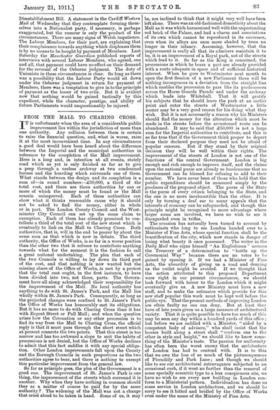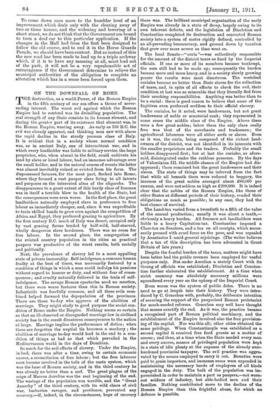FROM THE MALL TO CHARING CROSS.
IT is unfortunate when the area of a considerable public improvement lies within the jurisdiction of more than one authority. Any collision between them is certain to raise the financial question, and, what is worse, raise it at the most inconvenient time. In any circumstances a good deal would have been heard about the difference between the Imperial and the municipal authorities in reference to the completion of the Mall improvement. Here is a long and, in intention at all events, stately road which as yet is only finished so far as to give a peep through a useless archway at two condemned houses and the hoarding which surrounds one of them. What stands between the design and its completion is a sum of—in round numbers—X50,000, a third of the total cost, and there are three authorities by one or more of which the money must be found or the Mall remain unimproved. Each of these authorities can show what it thinks reasonable cause why it should not be asked to find the money, either in whole or in part. The London County Council and the West- minster City Council can set up the same claim to exemption. Each of them has already promised to con- tribute a third of the total cost of the new street which is eventually to link on the Mall to Charing Cross. Both authorities, that is, will in the end be poorer by about the same sum as that which is now in debate. The third authority, the Office of Works, is so far in a worse position than the other two that it refuses to contribute anything towards what for the moment it is the fashion to call a great national undertaking. The plea that each of the two Councils is willing to lay down its third part of the cost, and that nothing is now wanted but the missing share of the Office of Works, is met by a protest that the total cost ought, in the first instance, to have been divided into two, not three, parts. The Govern- ment have all along acknowledged their responsibility for the improvement of the Mall. No local authority has anything to do with St. James's Park, and the Mall lies wholly within St. James's Park. Consequently, so long as the projected changes were confined to St. James's Park the Office of Works has honourably met its obligations. But it has no more to do with Charing Cross than it has with Regent Street or Pall Mall ; and when the question arises how the Coronation or any other procession is to find its way from the Mall to Charing Cross, the official reply is that it must pass through the short street which at present connects the two points. That this street is too narrow and has too awkward a slope to suit the habits of processions is not denied, but the Office of Works declines to admit that this fact saddles it with any special obliga- tion. Other London improvements fall upon the County and the Borough Councils in such proportions as the two ,authorities agree to bear, and there is nothing to exempt this particular improvement from the general law.
So far as principle goes, the plea of the Government is a -good one. The improvement of St. James's Park is one thing, the improvement of the streets which surround it is another. Why when they have nothing in common should they as a matter of course be paid for by the same authority ? The widening of the Mall was not a change that cried aloud to be taken in hand. Some of us, it may be, are inclined to think that it might very well have been left alone. There was an old-fashioned domesticity about the Mall as it was which harmonised well with the unpretending red brick of the Palace, and had a charm and associations of its own which cannot be reproduced in its successor, even when its alleys are once more shaded by trees no longer in their infancy. Assuming, however, that the improvement is really all that its admirers maintain it to be, it is an improvement of a Royal park, not of the streets which lead. to it. So far as the King is concerned, the processions in which he bears a part are already provided with a route adequate in space and of sufficient historical interest. When he goes to Westminster next month to open the first Session of a new Parliament there will be nothing incongruous in a deviation from the straight line which enables the procession to pass like its predecessors across the Horse Guards Parade and under the archway which leads into Whitehall. That it will gratify his subjects that he should leave the park at an earlier point and enter the streets of Westminster a little sooner may be a very good reason for his doing what they wish. But it is not necessarily a reason why his Ministers should find the money for the alteration which must be made in the streets before the accustomed route can be abandoned. It may be said that £50,000 is not a large sum for the Imperial authorities to contribute, and this is so far true that if the Government think proper to depart from their declared purpose they need not be afraid of popular censure. But if they stand by their original decision they will be well within their rights. The improvement of the streets of London is not one of the functions of the central Government. London is big enough and rich enough to improve itself, and the claims upon the national purse are already so burdensome that no Government can be blamed for refusing to add to their number. We have never been of those who hold that the public expenditure should be measured simply by the goodness of the proposed object. The purse of the State is the purse of every citizen belonging to the State, and the one is no more inexhaustible than the other. It is only by turning a deaf ear to many appeals that the interests of economy can be safeguarded, and though this principle might be recognised to more advantage where larger sums are involved, we have no wish to see it disregarded even in trifles.
The occasion has naturally been turned to account by enthusiasts who long to see London handed over to a Minister of Fine Arts, whose special function shall be the beautification of the city, which now stands in danger of losing what beauty it once possessed. The writer in the Daily Mail who signs himself "An Englishman" accuses the Treasury of a determination to " bottle up the Ceremonial Way " because there are no votes to be gained by opening it. If we had a Minister of Fine Arts, the absurdity of giving us a road and denying us the outlet might be avoided. If we thought that the action attributed to this proposed Department were right in our present circumstances, we should look forward with terror to the London which it might eventually give us. A new Ministry must have a new staff, and to make the estimates which provide for this new staff popular this work must be kept well before the public eye. That the present methods of improving London are often faulty no one can deny. But at least they have of late years given us a large measure of architectural variety. That it is quite possible to have too much of this may be seen any day within a hundred yards of this office ; but before we are saddled with a Minister, " aided by a competent body of advisers," who shall insist that the houses built along a, street shall " conform one to the other in style and height," we should like to know some- thing of the Minister's taste. The passion for uniformity has often been the worst enemy that the architecture of London has had to contend with. It is to this that we owe the loss of so much of the picturesqueness of Piccadilly and Park Lane ; and though we should like to see our architectural extravagance subjected to an occasional curb, if it went no further than the removal of some specially eccentric type to a less conspicuous site, we have no wish to see every new building in London con- form to a Ministerial pattern. Individualism has done us some service in. London architecture, and we should be sorry to see it bitted and bridled by the Office of Works even under the name of the Ministry of Fine Arts.
To come down once more to the humbler level of an improvement which deals only with the clearing away of two or three houses, and the widening and lowering of a short street, we do not think that the Government are bound to turn a deaf ear to this particular application. If the changes in the Mall had from the first been designed to follow the old course, and to end it in the Horse Guards Parade, we should have been content. But as instead of this the new road has been made to lead up to a triple archway which, if it is to have any meaning at all, must lead out of the park, it will not be a very reprehensible act of extravagance if the Government determine to relieve the municipal authorities of the obligation to complete an alteration which has in a sense been forced upon them.











































 Previous page
Previous page